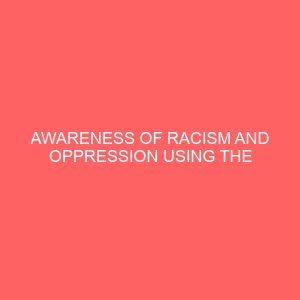Description
CHAPTER ONE
INTRODUCTION
This research is on Awareness of realism through the eyes of two renowned authors Chinua Achebe (A man of the people) and Adamu Kyuka Usman (The siege).
Realism is an approach to life that means dealing with the way things are. If you see the world through the lens of realism, you accept what’s in front of you and don’t pretend it’s otherwise.
Realism is the belief that some aspects of reality are ontologically independent of our conceptual schemes, perceptions, linguistic practices, beliefs, etc. Realism may be spoken of with respect to other minds, the past, the future, universals, mathematical entities (such as natural numbers), moral categories, the physical world, and thought. Realism can also be promoted in an unqualified sense, in which case it asserts the mind-independent existence of the world, as opposed to skepticism and solipsism. Philosophers who profess realism often claim that truth consists in a correspondence between cognitive representations and reality.
Realists tend to believe that whatever we believe now is only an approximation of reality but that the accuracy and fullness of understanding can be improved. In some contexts, realism is contrasted with idealism. Today it is more usually contrasted with anti-realism, for example in the philosophy of science. The oldest use of the term “realism” appears in medieval scholastic interpretations and adaptations of Greek philosophy.
Broadly defined as “the faithful representation of reality” or “verisimilitude,” realism is a literary technique practiced by many schools of writing. Although strictly speaking, realism is a technique, it also denotes a particular kind of subject matter, especially the representation of middle-class life. A reaction against romanticism, an interest in scientific method, the systematizing of the study of documentary history, and the influence of rational philosophy all affected the rise of realism. According to William Harmon and Hugh Holman, “Where romanticists transcend the immediate to find the ideal, and naturalists plumb the actual or superficial to find the scientific laws that control its actions, realists center their attention to a remarkable degree on the immediate, the here and now, the specific action, and the verifiable consequence” (A Handbook to Literature 428).
Many critics have suggested that there is no clear distinction between realism and its related late nineteenth-century movement, naturalism. As Donald Pizer notes in his introduction to The Cambridge Companion to American Realism and Naturalism: Howells to London, the term “realism” is difficult to define, in part because it is used differently in European contexts than in American literature. Pizer suggests that “whatever was being produced in fiction during the 1870s and 1880s that was new, interesting, and roughly similar in a number of ways can be designated as realism, and that an equally new, interesting, and roughly similar body of writing produced at the turn of the century can be designated as naturalism” (5). Put rather too simplistically, one rough distinction made by critics is that realism espousing a deterministic philosophy and focusing on the lower classes is considered naturalism.
In American literature, the term “realism” encompasses the period of time from the Civil War to the turn of the century during which William Dean Howells, Rebecca Harding Davis, Henry James, Mark Twain, and others wrote fiction devoted to accurate representation and an exploration of American lives in various contexts. As the United States grew rapidly after the Civil War, the increasing rates of democracy and literacy, the rapid growth in industrialism and urbanization, an expanding population base due to immigration, and a relative rise in middle-class affluence provided a fertile literary environment for readers interested in understanding these rapid shifts in culture. In drawing attention to this connection, Amy Kaplan has called realism a “strategy for imagining and managing the threats of social change” (Social Construction of American Realism ix).
Realism was a movement that encompassed the entire country, or at least the Midwest and South, although many of the writers and critics associated with realism (notably W. D. Howells) were based in New England. Among the Midwestern writers considered realists would be Joseph Kirkland, E. W. Howe, and Hamlin Garland; the Southern writer John W. DeForest’s Miss Ravenal’s Conversion from Secession to Loyalty is often considered a realist novel, too.
Other Views of Realism
“The basic axiom of the realistic view of morality was that there could be no moralizing in the novel [ . . . ] The morality of the realists, then, was built upon what appears a paradox–morality with an abhorrence of moralizing. Their ethical beliefs called, first of all, for a rejection of scheme of moral behavior imposed, from without, upon the characters of fiction and their actions. Yet Howells always claimed for his works a deep moral purpose. What was it? It was based upon three propositions: that life, social life as lived in the world Howells knew, was valuable, and was permeated with morality; that its continued health depended upon the use of human reason to overcome the anarchic selfishness of human passions; that an objective portrayal of human life, by art, will illustrate the superior value of social, civilized man, of human reason over animal passion and primitive ignorance” (157). Everett Carter, Howells and the Age of Realism (Philadelphia and New York: Lippincott, 1954).
“Realism sets itself at work to consider characters and events which are apparently the most ordinary and uninteresting, in order to extract from these their full value and true meaning. It would apprehend in all particulars the connection between the familiar and the extraordinary, and the seen and unseen of human nature. Beneath the deceptive cloak of outwardly uneventful days, it detects and endeavors to trace the outlines of the spirits that are hidden there; tho measure the changes in their growth, to watch the symptoms of moral decay or regeneration, to fathom their histories of passionate or intellectual problems. In short, realism reveals. Where we thought nothing worth of notice, it shows everything to be rife with significance.”
— George Parsons Lathrop, ‘The Novel and its Future,” Atlantic Monthly 34 (September 1874):313 24.
“Realism is nothing more and nothing less than the truthful treatment of material.” –William Dean Howells, “Editor’s Study,” Harper’s New Monthly Magazine (November 1889), p. 966.
“Realism, n. The art of depicting nature as it is seen by toads. The charm suffusing a landscape painted by a mole, or a story written by a measuring-worm.” –Ambrose Bierce The Devil’s Dictionary (1911)
Context and Controversy
In its own time, realism was the subject of controversy; debates over the suitability of realism as a mode of representation led to a critical exchange known as the realism war. (Click here for a brief overview.)
The realism of James and Twain was critically acclaimed in the twentieth century. Howellsian realism fell into disfavor, however, as part of early twentieth century rebellion against the “genteel tradition.” For an account of these and other issues, see the realism bibliography and essays by Pizer, Michael Anesko, Richard Lehan, and Louis J. Budd, among others, in the Cambridge Guide to Realism and Naturalism.
- BACKGROUND OF THE STUDY:
Chinua Achebe (born Nov. 16, 1930) is a Nigerian novelist, critic and poet; he is one of the most-read African authors. His works have primarily focused on “African politics, the depiction of Africa and Africans in the West, and the intricacies of pre-colonial African culture and civilization, as well as the effects of colonization of African societies” (Achebe, 1988b). His well-known literary critique An Image of Africa: Racism in Conrad’s “Heart of Darkness” (Achebe, 1988a) is considered by many to be the most assertive, debated, and seminal treatise of its type. Achebe rejected Joseph Conrad as “a thorough going racist” who projected Africa as “a metaphysical battlefield devoid of all recognizable humanity, into which the wandering European enters at his peril” (Ibid: 38). This said, the present paper investigates various aspects of realism that appear in Achebe’s novel A Man of the People, and describes various political and social changes that have taken place in Nigeria since its publication in 1967. It also evaluates A Man of the People as a work of fiction among other realistic novels.
Adamu Kyuka Usman, hails from Bafai-Kanai in the middle part of Nigeria. He holds a Bachelors, Masters and PhD degrees in law and is a Professor at the Faculty of Law, Ahmadu Bello University, Zaria. Other law books by the author include: The Law and Practice of Equity and Trust, Environmental Protection Law and Practice, and Nigerian Oil and Gas Industry: Institutions, Issues, Law and Policy.
Generally, English-language fiction falls into the categories of romance or realism. Romances tend to represent life as one might think it to be, and create a relatively heroic, adventurous, or picturesque world. In contrast, works of realism portray the world as it really appears. Books by realists such as Defoe tend to use a reportorial manner, presenting material in a circumstantial, matter-of-fact kind of way, and create for the reader an illusion of actual experience. Abrams (1971: 141) noted that the term ‘realistic novel’ “is more usefully applied to works which are realistic both in subject and manner … throughout the whole rather in parts ….” Additionally, Gray (1992: 241) has noted that realism “is best used for writers who show explicit concern to convey an authentic impression of actuality, either in their narrative style, or by their serious approach to their subject matter”. Among English-speaking African novelists, Chinua Achebe has been particularly successful in creating a realistic representation of an African environment. He is one of the major writers from the African subcontinent who have given a new direction to English-language African literature by representing, realistically, an African environment and giving expression to a sense of increasing disgust and unrest within its population. Carroll wrote that Achebe and Adamu appears to be continually haunted by nostalgia for the “rediscovery of Africa’s past” (Caroll, 1975: 11). Their novels appear to be an attempt to come to terms with a struggle, or, “as it were, to sensitively register their encounter with history, his people’s history” Ngugi (1975: 39) as well as to help his “society regain belief in itself and put away the complexes of the years of denigration and self-abasement” (Achebe, 1975: 43). Such realism is explicit in Achebe’s novels; he has written about the subjugated, exploited majority of the African population, and their vision of the future after gaining independence from colonial rule and emerging from the “colonial complex” (Duerden & Pieterse, 1972: 8). Explaining that this history dominates their lives, Achebe says, “I would be quite satisfied if my novels (especially the ones I set in the past) did no more than teach my readers that their past with all its imperfection was not one long night of savagery from which the first European acting on God’s behalf delivered them” (Achebe,1975: 44). Novels such as Things Fall Apart (1958), Arrow of God (1964), No Longer at Ease (1960), A Man of the People (1967), and Anthills of the Savannah (1987) exemplify his goal of social realism and his attempts to restore the lost dignity of his people by allowing his readers to examine their past and to resolve what he terms a ‘crisis in the soul.’ Anthills of the Savannah (1987) portrays modern, independent, post-colonial (in this case, neo-colonial) urban Africa. It details the general, societal and individual turbulence within a fictional late 20th century African country named Kanga, which clearly represents Nigeria. The novel dramatizes political struggles between Africans, illustrates the continuing influence of Britain and other Western countries on African economics and culture, and ends with a government being overthrown by a coup.
- STATEMENT OF PROBLEM:
Most Nigerians especially the ones born in the present Republic seems not to be able to comprehend the reasons behind the present condition of Nigeria, how Nigeria got where they are and how possible it can be to leap frog from the current situation. Realism is seen as an approach to life that means dealing with the way things are. The problem of Nigeria lies in their inability to accept things the way they are and think of a possible way of changing it. The two novels was chosen as to explore the concept of realism enshrined in them in attempt to teach Nigerians the needs to accept things the way they are before working towards improving them.
- OBJECTIVE OF THE STUDY:
The objective of this study is to create an awareness of realism through the eyes of two renowned authors Chinua Achebe (A man of the people) and Adamu Kyuka Usman (the siege).
This project concentrates on the theme of political suppression in A man of the people and the siege. The intention of the researcher is to show that the problem the country and her citizens are passing through did not start from nothing rather, it is something that started a long time ago through a gradual process.
- SCOPE AND LIMITATION OF THE STUDY:
The scope and limitation is on the theme of political apathy etc. in A man of the people and The siege by Chinua Achebe and Adamu Kyuka Usman so as to prevent the project from being untidy and ambiguous in nature. From intense research, we believe that A man of the people and the siege, an eye witness account is accurate enough to fully express the terms of political apathy because it has made a strong impact on African literature with its strong commentary on the cultural, political, racial and social issues going on during the period of 20th century.
The very title of the book “A man of the people and the siege” already gives us an idea of our thematic discussion because he uses the term ‘man of the people and siege’ in the title to emphasize the fundamental political facts of the country; the good citizens against bad politicians who hides under the pretense of having the people interest at heart.
- METHODOLOGY:
The methodology used in this project is a Carl Jung (1952) psychological approach in literature. It is believed that this approach will best expose the inner mind and psychological torture of the people in A man of the people. Political and social responsibilities are better analyzed, examined and portrayed through the workings of the intellectual thinking of those affected. This approach is the only approach that has helped to review visual and close insight of confrontations and conflicts between the haves and have not.








Reviews
There are no reviews yet.